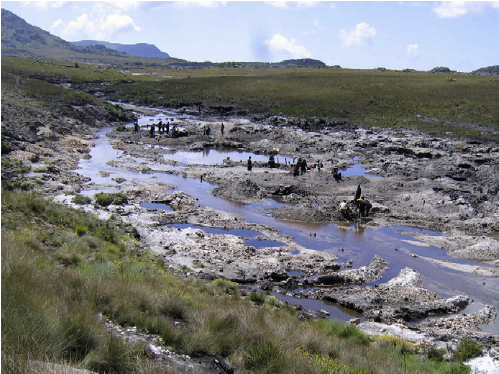Zimbabwe Environmental Law Association (ZELA), in their recent situational report on illegal mining activities taking place in protected areas, noted that illegal miners are encroaching onto sacred areas when carrying out their activities.
“The illegal miners are not selective in terms of where they mine in the park. To them, there are no sacred places. All they are looking for is the yellow grain to make a living. According to some local traditional leaders, illegal alluvial gold mining in the Chimanimani Mountain is causing the destruction of many sacred areas,” read the report.
“The destruction of the sacred areas violates the Ndau communities’ cultural rights as provided for in the Constitution. The local community used sacred places for conducting their traditional religious rituals. The destruction of sacred places may cause harm to the community.”
The report stated that when illegal miners purify their products they pollute local water sources.
“The water source for communities around the Chimanimani National Park flows from the mountain. Prior to the illegal gold mining activities in the park, most community members were accessing clean water from the Mountains in Chimanimani,” the report read.
“The rivers would flow all year round as the sources were undisturbed. However, due to the advent of illegal gold mining, many community members shared that the water has become dirty. The water from the rivers is now filled with mud and therefore no longer fit for human and livestock consumption.”
ZELA explained that the communities also fear that the water could be contaminated with mercury, which is commonly used by artisanal miners.
“Water pollution by illegal miners violates the communities’ constitutional right of access to clean and potable water as stipulated in Section 77 of the Constitution,” noted the report.
Zimbabwe Environmental Law Association (ZELA), in their recent situational report on illegal mining activities taking place in protected areas noted that illegal miners are encroaching onto sacred areas when carrying out their activities.
“The illegal miners are not selective in terms of where they mine in the park. To them, there are no sacred places. All they are looking for is the yellow grain to make a living. According to some local traditional leaders, illegal alluvial gold mining in the Chimanimani Mountain is causing the destruction of many sacred areas,” read the report.
“The destruction of the sacred areas violates the Ndau communities’ cultural rights as provided for in the Constitution. The local community used the sacred places for conducting their traditional religious rituals. The destruction of the sacred places may cause harm to the community.”
The report stated that when illegal miners purify their products they pollute local water sources.
“The water source for communities around the Chimanimani National Park flows from the mountain. Prior to the illegal gold mining activities in the park, most community members were accessing clean water from the Mountains in Chimanimani,” the report read.
“The rivers would flow all year round as the sources were undisturbed. However, due to the advent of illegal gold mining, many community members shared that the water has become dirty. The water from the rivers is now filled with mud and therefore no longer fit for human and livestock consumption.”
ZELA explained that the communities also fear that the water could be contaminated with mercury, which is commonly used by artisanal miners.
“Water pollution by illegal miners violates the communities’ constitutional right of access to clean and potable water as stipulated in Section 77 of the Constitution,” noted the report.

